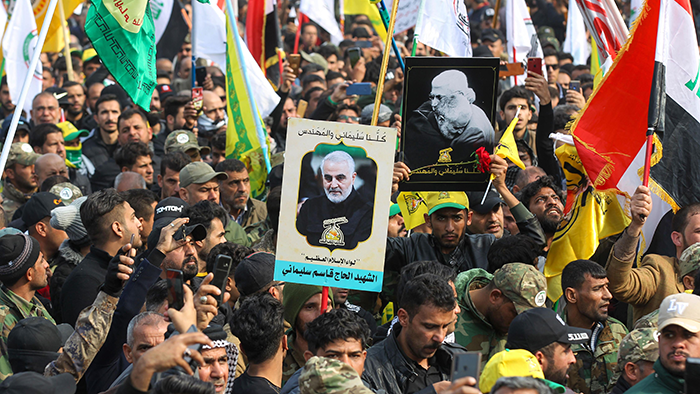



 Kevin Barrett
Kevin BarrettIf some Iraqis had forgotten who their real enemy is, the USA working in tandem with Israel has sent them a forceful reminder. The dastardly murder of Iranian General Qassem Soleimani, who was lured to Baghdad with a peace offer, then ambushed in a cowardly drone attack that also killed Iraqi commander Abu Mahdi al-Muhandis, demonstrated the lawless brutality and arrogance of the American occupation — and united Iraqis in understanding that their top priority must be the removal of US presence from their country.
Populist cleric Sayyid Muqtada al-Sadr floated the idea of a “million-man march” to eject US forces, and called on all armed groups to unite against the occupation. Millions joined the march on January 24 in Baghdad. Al-Sadr sent a letter to parliament demanding:
• the immediate cancellation of the security agreement with the US;
• closure of the massive US embassy;
• expulsion of US troops “in a humiliating manner”; and
• the criminalization of any communication with the US government.
Before the murder of General Soleimani and al-Muhandis, Muqtada al-Sadr had been at odds with Interim Prime Minister ‘Adil ‘Abd al-Mahdi. Al-Sadr was a key player in forcing ‘Abd al-Mahdi to step down as prime minister, and was expected to once again play a role as kingmaker when the next prime minister is chosen. But in December al-Sadr seemingly woke up to the fact that the demonstrations that had been destabilizing Iraq since October —demonstrations that al-Sadr supported and his followers attended — were synthetic shenanigans sparked by the Americans and their mischief-making allies. Then, as the new year began, the shocking murders of Gen. Soleimani and al-Muhandis demonstrated, in unmistakable terms, that the Americans were the prime source of chaos and destruction in Iraq. The deranged terrorism of murderers Trump and Pompeo put ‘Abd al-Mahdi, al-Sadr, and al-Hashd al-Sha‘bi and its allies on the same page. Everyone now agrees: the USA must be sent packing.
In the wake of the horrific assassination, Prime Minister ‘Abd al-Mahdi revealed the shocking truth about the ongoing US-orchestrated destabilization of Iraq. In a speech to parliament shortly after the assassination of Gen. Soleimani, ‘Abd al-Mahdi explained that the US had refused to finish electricity and infrastructure projects unless handed 50% of Iraq’s oil revenues,
This is why I visited China and signed an important agreement with them to undertake the construction instead. Upon my return, Trump called me to ask me to reject this agreement. When I refused, he threatened to unleash huge demonstrations against me that would end my premiership. Huge demonstrations against me duly materialized and Trump called again to threaten that if I did not comply with his demands he would have Marine snipers on tall buildings target protesters and security personnel alike in order to pressure me. I refused again and handed in my resignation. To this day the Americans insist on us rescinding our deal with the Chinese. After this, when our Minister of Defense publicly stated that a third party was targeting both protestors and security personnel alike [just as Trump had threatened] I received a new call from Trump threatening to kill both me and the Minister of Defense if we kept on talking about this “third party.”

‘Abd al-Mahdi confirmed widespread suspicions that NATO’s Operation Gladio B color revolution agents were behind the demonstrations in Iraq, just as they were behind the Syrian and Ukrainian regime-change projects. Using applied mass psychology and social media manipulation to get people into the streets, the Gladio B operatives then deploy snipers who fire on both police and demonstrators, triggering intensified conflict designed to take down the targeted government. Mafia-style assassinations and threats are also a key part of their tool kit.
‘Abd al-Mahdi also revealed that Gen. Soleimani was murdered after he was lured to Baghdad on a peace mission aimed at de-escalating tensions with Saudi Arabia. Was Bin Salman involved in setting Gen. Soleimani up? Or are the Saudis honestly hoping to reduce tensions and restore regional stability? If the latter is the case, the Americans and some of their regional allies may have killed Gen. Soleimani to prevent peace and stability from breaking out (a stable and prosperous region will inevitably become more powerful, independent, and impervious to gangster-style resource extraction by external powers).
‘Abd al-Mahdi, al-Sadr, al-Hashd al-Sha‘bi, and all honest Iraqis now understand that their country is occupied by forces of pure evil. The Americans must evacuate from the entire region and never come back. The Zionists too. The only questions involve timetable and tactics.
The Iraqi government, comprising both the parliament and the prime minister, has officially ordered the US to pack its bags and go home. The US responded with its habitual muddle-headed arrogance: first the Pentagon officially sent Iraq a letter confirming its intention to comply with Iraqi orders and withdraw. Then Defense Secretary Mark Esper said whoops, sorry, that letter was just a draft that we sent by mistake. Pompeo, for his part, insisted the US would stay. Then the Pentagon announced in mid-January that after a two week pause it was resuming “joint operations” with the Iraqi military — though no details were offered concerning what kind of operations, and with which branch of the Iraqi military. One wonders who in the Iraqi military would cooperate with a country that had just assassinated one of their leading commanders?!
The ten-month run-up to the November 2020 US presidential elections will likely feature growing anti-occupation protests in Iraq, such as al-Sadr’s proposed million-man-march, alongside escalating hit-and-run harassment of US forces throughout the region. Anti-occupation forces have every reason to raise the stakes during election season, when Trump will feel political pressure to pull out. Anti-occupation military activities will be strategic, big enough to grab space on the front pages of US newspapers, but not so big as to generate gigantic screaming “New Pearl Harbor” headlines that could rally Americans behind a bellicose president (if a huge mediagenic “attack” happens and is immediately blamed on Iran — the most likely scenario would be a “Persian Gulf of Tonkin incident” in which a US ship is sunk with considerable loss of life — it would undoubtedly be a 9/11-style false flag, as openly called for by such pro-Israeli operatives as Patrick Clawson of WINEP).
Alongside the short-term game plan for the coming months, Iraqi decision-makers also need to be mindful of Iraq’s role in the long-term shift from the US-dominated post-Cold War unipolar world order to the coming multipolar Eurasian order whose economic backbone will be China’s Belt and Road Initiative. Iraq must get out from under US occupation and diversify its regional partners. ‘Abd al-Mahdi was already on the right track when he chose Chinese rather than American contractors for Iraqi infrastructure contracts (at great political and personal risk). The Americans are leaving anyway, driven out by the self-inflicted wound of their atrocious behavior culminating in the assassination of Gen. Soleimani. According to the energy analyst site Chatham House, “as international (that is, Western) oil companies are withdrawing staff for safety reasons, anticipating potential attacks by both Iraqi and Iranian sources. It is now very unlikely that the crucial ‘common seawater supply project’ being run by Exxon — essential for expanding production capacity — will go ahead in the near future.” The vacuum will surely be filled by China, the leading customer for Iraqi and regional oil.
As the US military flees with its tail between its legs, driven out by the avengers of the martyred Gen. Soleimani, Iraq will seek security assistance from saner, more reliable partners, starting with Iran and Russia. Iraqi parliamentary security and defense committee chair Muhammad Rida announced in mid-January that Iraq will resume efforts to purchase the Russian S-400 air defense system, a decision that will certainly displease the Americans. And security cooperation with Iran will undoubtedly intensify as the US is forced to initiate its evacuation. Once the US is gone, Iraq will be in a position to cooperate with Iran, Syria, and Turkey in efforts to take back its oil-rich northern regions currently being exploited by the Kurds with the help of outside powers, including Israel.
If Iraq can force the US into a humiliating retreat, then move to establish genuinely Islamic and independent governance (preferably following the walayah al-faqih model), take its place as a key node of the Belt and Road project, and finally join with other regional nations in ending the Zionist colonial settler project in Palestine, the sacrifices of millions of Iraqi martyrs in the anti-occupation struggle will have achieved supreme success in this world as well as the next.
